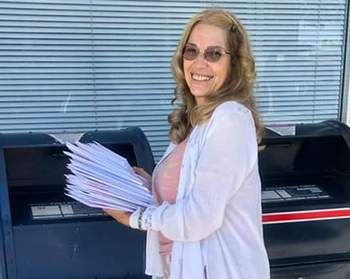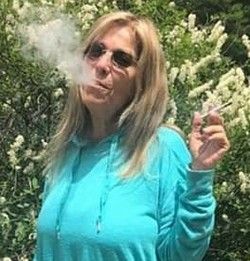
Publisher:
Bonnie King
CONTACT:
Newsroom@Salem-news.com
Advertising:
Adsales@Salem-news.com

~Truth~
~Justice~
~Peace~
TJP
Feb-05-2020 14:37

 TweetFollow @OregonNews
TweetFollow @OregonNews
Making of a Marijuana Mogul: The Stephanie Landa Story
Mindi Hall, Salem-News.com Cannabis De-ClassifiedEXCLUSIVE INTERVIEW with Stephanie Landa, hippy girl, adventurer, cannabis advocate and former Federal prisoner.
 Stephanie Landa mailing money orders to cannabis POW's. Photo: Landa/Facebook |
(PORTLAND, Ore.) - Stephanie Landa, born June 7, 1946 in New York grew up amid a swiftly evolving moment in American history. Memories of the great depression dissipating, coupled with the recent end of WWII, left people full of optimistic hope.
As promptly as women were thrust into the factories and the workforce, returning soldiers incite women to resume homemaking duties. Hence, entered the baby boom generation.
Stephanie, born to a middle class stay-at-home mom and a WWII fighter pilot, was a stubborn and independent child. A product of the baby boom, little did her parents know they were raising a child who would grow up breaking all the rules by bending social norms regardless of how the world told her to act.
Longterm Perils of Childhood Abuse
When asked about her childhood, Stephanie replies, "It was painful, physically and emotionally." For instance, young five-year-old Stephanie learned the harsh reality of antisemitism.
Entering a predominantly Christian school as a Jewish student resulted in Stephanie often returning home in tears.
She was teased by the kids in school and couldn't fathom why. Consequently, her parents chose to remove her from the senseless cruelty. They relocated to a Jewish neighborhood in New Jersey, despite the inconvenient commute for her father, a Pan Am pilot.
Physically, as long as Stephanie recalls, she suffered as well. Her childhood was speckled with frequent, and at times lengthy, hospital visits for a stomach disorder caused by a shortened intestinal tract. Her stomach digested food within one hour instead of the standard seven. This illness would alter the course of her life in ways no one could predict.
Her younger years, although not easy, weren't totally troublesome. Summers spent at her parents country club and holidays spent jetting off to destinations such as Miami and Puerto Rico provide happy memories. Her upper middle class family afforded $10 flight tickets with ease thanks to the perks of a pilot as a father. Financially, her childhood was comfortable.
The free love anti-establishment 1960's
In 1959 Stephanie, thirteen, looked the part of a grown woman. She sported long chestnut brown hair, green eyes and curves that grabbed people's attention. Her general nature, a desire for excitement, prompted the bored, middle-class teenager to shake things up.
 Stephanie in her youth. |
It was that summer that young Stephanie started exploring her sexuality, independence, and marijuana use with vigor.
As a girl of the 50's, Stephanie had little control over the life she had been given. Never satisfied in the passenger seat, she sought to end her status as a virgin, and succeeded. She became convinced women wielded the most power between the sheets.
Along the way she was also introduced to her future best friend, affectionately nicknamed, "Ms. Pot."
"Marijuana was a mind-altering experience which turned me away from aimless parties toward a more profound perception of the world around me." Additionally, she realized marijuana relaxed her stomach, allowing proper digestion, relieving pain.
From that moment on she became a secret "pothead." Although taboo, she felt this plant allowed her to finally live a normal life.
By the early 60's Stephanie was in high school and society was changing quickly. The world was exposed to rock and roll and the Beatles, the Kennedy assassination, and Vietnam.
Stephanie's peer group was comprised of college-age revolutionaries with whom she marched for civil rights, women's rights, against the war, against nuclear power, or anything else they deemed unjust.
Here she found an audience who loved marijuana as much as she did. Selling pot became a part-time profession and turned out to be much more entertaining than flipping burgers or a life of housewife duties. She realized that among those who also like to smoke she commanded a certain amount of power.
"A young lady willing to supply something so exotic and rare in the 1960's was always welcome, mistakes forgiven, and eccentricities indulged as long as they didn't forget to bring the pot," she said. Stephanie never really lived a normal teenage life.
Married and divorced three times, her personal life wasn't typical, however business was booming. Due to the rarity of a beautiful female pot dealer she found herself rubbing elbows with artist celebrities and the wealthy.
She quickly realized her popularity was due to what she had to offer not about who she was. Her focus shifted back to the counterculture that introduced her to "Mary Jane" in the first place. She was drawn to the social awareness and non-judgmental philosophies attached to the hippies.
From New Jersey to California
In 1966 Stephanie followed her family to California. It is in Malibu that she found her home as a true hippie. Although the culture was nearer to her heart the quality of cannabis was appalling.
Californians were smoking cheap imported weed from Mexico, "often full of stem and seed." While other women her age were hosting Tupperware parties, Stephanie realized the business opportunity before her and began traveling to and from the east coast bringing higher quality Colombian with her.
This life was much more appealing than the humdrum housewife life of her peers and she easily avoided law enforcement suspicion as a middle-class female. In 1966 it was the perfect cover.
Stephanie was even more popular in California than the east coast and easily moves in and out of all types of social circles.
As the sixties wound down, Stephanie met an enchanting young surfer boy who taught her the basics of growing marijuana. One day he decided to head to Hawaii so Stephanie threw caution to the wind and followed him.
 Stephanie's first grow, 1969. |
Her impulsive decision provided her the opportunity to learn more about cannabis by growing weed in the sugar cane fields. She was better at growing and selling marijuana than maintaining relationships and had enough cash to finance a move to Morocco. So she left, which led to travel through many countries.
She recounts numerous tales of smuggling cannabis past distracted border patrol agents with her beautiful green eyes and charm. Her travels afforded her men and crazy adventures. By 1969 she returned to the states just in time for a three-week adventure at Woodstock and soon after, riots in her new home town, Isla Vista.
History reports the riots culminated with the burning of the Bank of America building in 1970 at the hands of angry students protesting the war. However, her involvement in those stories is for another time.
Life after the riots in Isla Vista cemented Stephanie further in the hippie counterculture. She and other community members sought to create an urban paradise consisting of gardens brimming with vegetables, herbs, fruit trees and of course Ganja. A utopia that idealistic hippies of the early 70's felt would save the world.
Eventually, Stephanie had to move on, “Grass doesn’t grow on a rolling stone!”
“These were the good old days, the golden years of marijuana and of peace, love and happiness,” she said. These were also the years before the government issued its war on drugs.
Biggest risk of marijuana was getting caught.
By now, she learned quite a bit about the art of growing cannabis herself. She even discovered cloning female plants before it was common, improving the quality of the flower and eliminated those pesky seeds. However, at that time, the risks of growing were higher than smuggling.
Consumer desire for quality weed, joined with her ability to travel cheaply, and her love of Mary Jane, made this a lucrative business venture. Regardless of the growing and distribution risks, wherever Stephanie roamed so too was her friend "Ms. Pot".
Consequently, almost inevitably, Stephanie was busted for the first time while entering the US from Asia in 1974. Luckily, as a first time offender, she was sentenced to probation, five years. Free to continue about her life, she obstinately did so.
She nearly completed her sentence without a probation violation. However, her father fell into ill health and needed surgery, which was enough for her to blow off the parole officer's denial of the flight request and be by her father's side regardless of the consequences.
Stephanie rolled the dice and lost. During her next check-in, "The federal agents were there to take me. I had to call my attorney to pick up my car that had 10 lbs of homegrown in it and my dog. He accepted the pot as payment for my case. Nevertheless, I went to federal prison for two years."
Prison, the first time around, was a far cry from what it's like today. The biggest difference being it was co-ed. Stephanie was able to use her charm and good looks to her advantage. In general, minimum security prison life wasn't half bad.
"A fellow inmate and I started a vegetarian kitchen. Murderers, bank robbers, and other types of criminals are whom I preached vegetables,karma, and meditation. Our food was always eaten first. We grew a vegetable garden and I was able to consume cannabis everyday.
"We even tried to grow pot in between cornrows. The guards pulled out the small plants, but we kept trying. By the second year I tried to humanize the guards by using peaceful philosophy. It didn't work."
The world changes before her eyes
When Stephanie was finally released, another decade was all but over and she was well into her 30's. The 80's saw the worldwide war against drugs in full swing. The Vietnam war was a fading memory (unless you were a returning Vet).
Greed, cocaine and danger had taken a grip on the marijuana market, adding ammunition to government propaganda and the "Say No to Drugs” campaign.
With the heat of law enforcement ever-present, Stephanie had a few near-misses over the next decade, yet managed to steer clear of trouble while maintaining financial security from her unconventional business ventures.
 Stephanie in the 70's, living it up in the sunshine. |
As the years progressed, so also excelled in her gardening skills. Stephanie’s dedication to her craft never wavered.
Approaching 40, Stephanie pondered on her many lives and adventures. Something was missing.
"I had forgotten to have a child, so I had one, Max. My love, green-eyed, red-haired boy." As always, once Stephanie decided what she wanted, she went after it. Of all the boys Stephanie had loved, this boy would forever hold her heart.
Today, Max is in his 30's and remains her pride and joy. “I have a novel’s worth of adventures as the mom of Max.”
Although she clearly saw the advantage of being a black market marijuana entrepreneur, Stephanie never forgot what started her relationship with "Ms. Pot", her excruciating childhood medical condition.
She always felt that the government was lying. Cannabis heals. She is living proof. As a mother, it was more important than ever for her to speak her truth.
By 1996 medical marijuana laws were on the books in California. All her life the government pushed propaganda, causing public fear. Politics and public opinion were changing. Maybe the government was letting up?
To test that theory, Stephanie's first prescription for cannabis finally came when she was 52 years old out of a clinic in San Francisco.
"I was thinking I was really alive now. Now that I have my prescription, I am thinking of coming out of the pot cloud.
"I'd say I am a nice person who smokes pot, I am a kid's mom who smokes pot. I am a volunteer who smokes pot. I would never harm anyone and I follow the ten commandments and I smoke pot. I love and talked to my mom and dad daily and I smoke pot," she proudly proclaimed.
However, Stephanie would soon see "legal" isn't really legal and pot prejudice still prevailed.
California was home base for the birth of the green rush. Stephanie had always been on the forefront of the industry. After a lifetime of growing and selling underground, the San Francisco medical marijuana task force and the district attorney bestowed their blessings upon Stephanie and longtime friend and partner Tom Kikuchi.
A government-sanctioned marijuana garden for the benefit of the sick and dying was a dream come true. In all the years Stephanie grew and sold this was the first time she felt compliant with laws enabling her to help those in need and legitimize her career.
Be that as it may, the legal grey area was enough for federal agents to swoop in and charge the two with manufacturing. Her previous arrest made her eligible for a life sentence. She was not able to use medical necessity as a defense.
She felt her hands were tied, so chose to take a plea deal and sentenced to 41 months in federal prison.
Tom, whose sentence was slightly shorter, served his time first. The judge allowed for their sentences to be staggered in order to ease the disruption to Max's life.
In case you're wondering, even impending prison time did not convince Stephanie to conform to social standards. While Tom was in prison, she did what she always did, relied on "Ms Pot" to keep her company until it was her time to turn herself in.
Federal Prison: Mean, Cold and Cruel
Stephanie started her sentence in 2007, at the age of 60, surrendering herself to the government surrounded by dozens of supporters and well-wishers. This time prison wouldn't be anything like the first time.
For the first six months she waited in county jail for space in a federal institution. Once transferred, she was confined to solitary for a month, not even afforded a bed.
In a letter written from prison February 2007 Stephanie stated, "The system sucks. The judge wanted me incarcerated not tortured. My physical condition has been of no concern to anyone since I was taken from all my loved ones. If anything they have been crueler to me when I complain.
"I only hope I can make it till my release. The camp kitchen has been closed for the past year due to black mold. The unit I will be going to has been condemned for black mold. But since it is cheaper to pay the fines than fix it that's what the federal government is doing."
At this stage of life Stephanie wasn't just suffering from a childhood digestion condition or from the typical aches and pains of a 60-year old woman. Prior to her arrest, she had been hit by a car as a pedestrian and suffered irreparable damage to her shoulder.
At home, cannabis aided her recovery. In prison, not only did the conditions inherently cause her more pain, there was no relief in sight. She was treated as if she was the worst society has to offer, thrown away like trash.
 Stephanie & "Ms Pot" |
"I am on the floor in the hole (solitary)... Still no bed. My whole body aches. I am freezing cold. The hole is where they put people who are bad, and a problem, I am neither. My shoulder has frozen up. I don't understand this treatment," she wrote from prison.
Prison was meaner, colder, crueler, not co-ed, and unlike anything she had ever experienced. Yet, she persisted and survived.
Finally released in January of 2010, she promptly returned to living life at its fullest even though her health was worse. This time she would not forget her brothers and sisters still serving or preparing to serve federal time for standing up for what is right, the choice to consume and grow a plant known to heal. A plant no worse than alcohol.
Born from her pain and the pain of her fellow brothers and sisters was a prison outreach program LPOP, The Landa Prison Outreach Program. Over time the organization grew into what is known today as Freedom Grow.
Not long after her release from the mold-ridden institution, Stephanie was diagnosed with cancer. Even cancer proved no match for a determined Stephanie. She and "Ms. Pot" survived that too.
Freedom to Grow is Freedom to Live
Today at the age of 73, and after all the years of pain, protests, parties, boys, and the BOP, little has changed. Stephanie is still stubborn and independent.
She still does what she knows is right. She still loves cannabis. Her son Max still makes her heart sing. She loudly and proudly advocates for prisoners' rights and legalization at the federal level.
The mission of her award-winning, non-profit organization Freedom Grow, is to bring light to a dark cell. Volunteers raise funds that are dispersed to non-violent cannabis prisoners so they can afford simple life necessities while incarcerated. For more information, please visit her Facebook page: www.facebook.com/stephanie.landa.397
When asked if there is anything that would compel her to quit her lifelong relationship with Ms. Pot, she quickly responded, "Absolutely not!”
The only thing that might slow Stephanie down? “The release of every single human trapped in a cage for a plant that is making a lot of people a bunch of money and healing the sick."
That is an outstanding answer.
Mindi Hall, Writer is Co-founder at Voices Of The Cannabis War, Volunteer at Freedom Grow and Volunteer at CAN-DO Foundation - Justice Through Clemency. She has been a KBOO Community Radio Volunteer and Cchi2016 RADIO, Voices Of The Cannabis War Show. You can reach Mindi Hall at thetigerfairytrap@gmail.com.
Articles for February 4, 2020 | Articles for February 5, 2020 |


Quick Links
DINING
Willamette UniversityGoudy Commons Cafe
Dine on the Queen
Willamette Queen Sternwheeler
MUST SEE SALEM
Oregon Capitol ToursCapitol History Gateway
Willamette River Ride
Willamette Queen Sternwheeler
Historic Home Tours:
Deepwood Museum
The Bush House
Gaiety Hollow Garden
AUCTIONS - APPRAISALS
Auction Masters & AppraisalsCONSTRUCTION SERVICES
Roofing and ContractingSheridan, Ore.
ONLINE SHOPPING
Special Occasion DressesAdvertise with Salem-News
Contact:AdSales@Salem-News.com



Terms of Service | Privacy Policy
All comments and messages are approved by people and self promotional links or unacceptable comments are denied.
vbw February 8, 2020 1:27 pm (Pacific time)
Great story! Fun to read. Well written!
[Return to Top]©2026 Salem-News.com. All opinions expressed in this article are those of the author and do not necessarily reflect those of Salem-News.com.